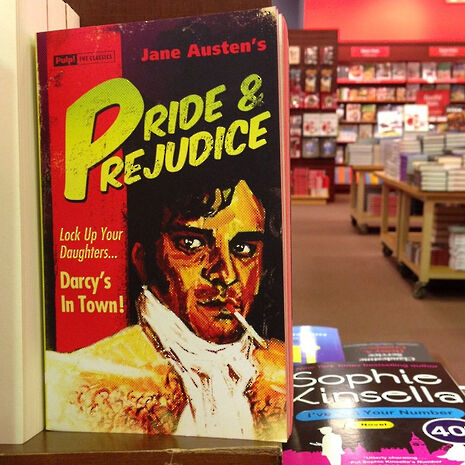Less of the novel. More of the novels
Fiona Stainer knows the secret for a fantastic screenplay: use a book

Last week the ebullient Mr Selfridge flounced back onto our screens. If you missed the relatively mediocre first season, Mr Selfridge is essentially what Downton Abbey would look like if Mary Portas were the producer. Strangely, the man behind the screenplay, Andrew Davies, is responsible for some of the best costume dramas to grace our screens: Bleak House, Little Dorrit, and the famous BBC Colin-Firth-in-wet-shirt adaptation of Pride and Prejudice. Mr Selfridge may look as sumptuous, but when it comes to substance it pales in comparison. Perhaps Davies should stick to what he does best – adapting novels, rather than attempting to be novel. Adaptations trump vapid original representations of history (Mr Selfridge, Downton Abbey) for several reasons:
They actually have plots - not surprising, given they’re the work of storytelling greats such as Austen, Dickens and the Brontës.
They force you to read the original. I feel guilty about watching adaptations of novels I haven’t read, so I usually attempt to do so before they hit our screens. Who says TV doesn’t make you cultured?
You can pretend you’ve read the original. Obviously my well-meaning enthusiasm doesn’t always translate to action. But hey, no one need know, right?
They’re not all obsessed with ‘The War’. According to Julian Fellowes’ recent projects, history consists of WWI and the sinking of the Titanic. Unfortunately, at the end of the most recent Mr Selfridge, poor old Franz Ferdinand was shot again, which means we’re no doubt in for more sanitised depictions of trenches and wholesome representations of Home Front life.
They inspire debate. When dearly loved characters and plots are reconstructed on our screens, it gets people talking about the original text and why this new interpretation is completely unfounded/wonderfully understated.
Adaptations of classic novels have been thin on the ground lately. Perhaps these things come in waves – ITV had an Austen Binge a few years ago, around the time that the BBC were particularly enamoured by Dickens. Even so, there are plenty of lesser-known titles that have inspired some brilliant dramas in the last few years, primarily the BBC’s Parade’s End, based on the works of Ford Madox Ford, which saw Rebecca Hall and Benedict Cumberbatch give sensational performances.Yes, ok, it was partially set in the war, but unlike dear old Downton, 85 per cent of the script didn’t consist of references to this fact.
There’s good news for adaptation fans though – Davies has a six-part version of War and Peace in the works for 2015. I’d better get reading.
 News / SU reluctantly registers controversial women’s soc18 December 2025
News / SU reluctantly registers controversial women’s soc18 December 2025 News / Dons warn PM about Vet School closure16 December 2025
News / Dons warn PM about Vet School closure16 December 2025 Features / Should I stay or should I go? Cambridge students and alumni reflect on how their memories stay with them15 December 2025
Features / Should I stay or should I go? Cambridge students and alumni reflect on how their memories stay with them15 December 2025 News / Cambridge study finds students learn better with notes than AI13 December 2025
News / Cambridge study finds students learn better with notes than AI13 December 2025 Fashion / The art of the formal outfit 18 December 2025
Fashion / The art of the formal outfit 18 December 2025








